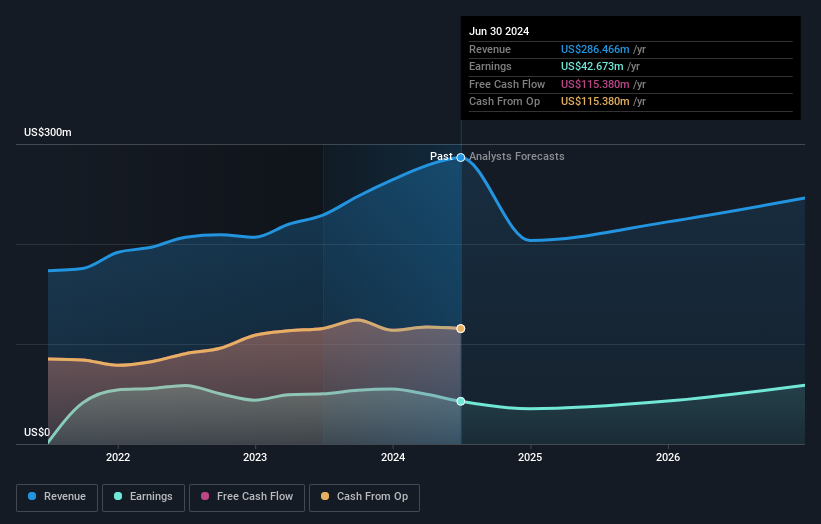Medallion Financial Corp. (NASDAQ:MFIN) surges 11%; retail investors who own 48% shares profited along with institutions
Key Insights
- Significant control over Medallion Financial by retail investors implies that the general public has more power to influence management and governance-related decisions
- 45% of the business is held by the top 25 shareholders
- Insiders have been buying lately
To get a sense of who is truly in control of Medallion Financial Corp. (NASDAQ:MFIN), it is important to understand the ownership structure of the business. With 48% stake, retail investors possess the maximum shares in the company. Put another way, the group faces the maximum upside potential (or downside risk).
Following a 11% increase in the stock price last week, retail investors profited the most, but institutions who own 31% stock also stood to gain from the increase.
Let's delve deeper into each type of owner of Medallion Financial, beginning with the chart below.
View our latest analysis for Medallion Financial

What Does The Institutional Ownership Tell Us About Medallion Financial?
Institutional investors commonly compare their own returns to the returns of a commonly followed index. So they generally do consider buying larger companies that are included in the relevant benchmark index.
As you can see, institutional investors have a fair amount of stake in Medallion Financial. This suggests some credibility amongst professional investors. But we can't rely on that fact alone since institutions make bad investments sometimes, just like everyone does. If multiple institutions change their view on a stock at the same time, you could see the share price drop fast. It's therefore worth looking at Medallion Financial's earnings history below. Of course, the future is what really matters.

Hedge funds don't have many shares in Medallion Financial. Because actions speak louder than words, we consider it a good sign when insiders own a significant stake in a company. In Medallion Financial's case, its President, Andrew Murstein, is the largest shareholder, holding 10% of shares outstanding. Meanwhile, the second and third largest shareholders, hold 7.9% and 4.8%, of the shares outstanding, respectively. Interestingly, the second-largest shareholder, Alvin Murstein is also Chief Executive Officer, again, pointing towards strong insider ownership amongst the company's top shareholders.
Our studies suggest that the top 25 shareholders collectively control less than half of the company's shares, meaning that the company's shares are widely disseminated and there is no dominant shareholder.
Researching institutional ownership is a good way to gauge and filter a stock's expected performance. The same can be achieved by studying analyst sentiments. Quite a few analysts cover the stock, so you could look into forecast growth quite easily.
Insider Ownership Of Medallion Financial
While the precise definition of an insider can be subjective, almost everyone considers board members to be insiders. Company management run the business, but the CEO will answer to the board, even if he or she is a member of it.
Insider ownership is positive when it signals leadership are thinking like the true owners of the company. However, high insider ownership can also give immense power to a small group within the company. This can be negative in some circumstances.
Our most recent data indicates that insiders own a reasonable proportion of Medallion Financial Corp.. Insiders own US$44m worth of shares in the US$202m company. This may suggest that the founders still own a lot of shares. You can click here to see if they have been buying or selling.
General Public Ownership
The general public-- including retail investors -- own 48% stake in the company, and hence can't easily be ignored. While this group can't necessarily call the shots, it can certainly have a real influence on how the company is run.
Next Steps:
While it is well worth considering the different groups that own a company, there are other factors that are even more important. Case in point: We've spotted 3 warning signs for Medallion Financial you should be aware of, and 1 of them is a bit concerning.
Ultimately the future is most important. You can access this free report on analyst forecasts for the company.
NB: Figures in this article are calculated using data from the last twelve months, which refer to the 12-month period ending on the last date of the month the financial statement is dated. This may not be consistent with full year annual report figures.
Have feedback on this article? Concerned about the content? Get in touch with us directly. Alternatively, email editorial-team (at) simplywallst.com.
This article by Simply Wall St is general in nature. We provide commentary based on historical data and analyst forecasts only using an unbiased methodology and our articles are not intended to be financial advice. It does not constitute a recommendation to buy or sell any stock, and does not take account of your objectives, or your financial situation. We aim to bring you long-term focused analysis driven by fundamental data. Note that our analysis may not factor in the latest price-sensitive company announcements or qualitative material. Simply Wall St has no position in any stocks mentioned.
 Index Options
Index Options CME Group
CME Group Nasdaq
Nasdaq Cboe
Cboe TradingView
TradingView Wall Street Journal
Wall Street Journal